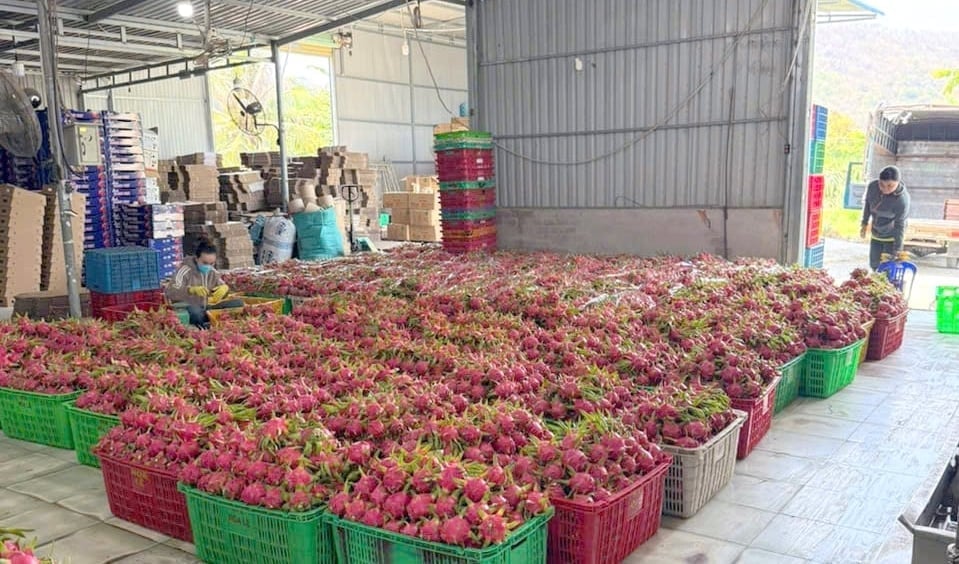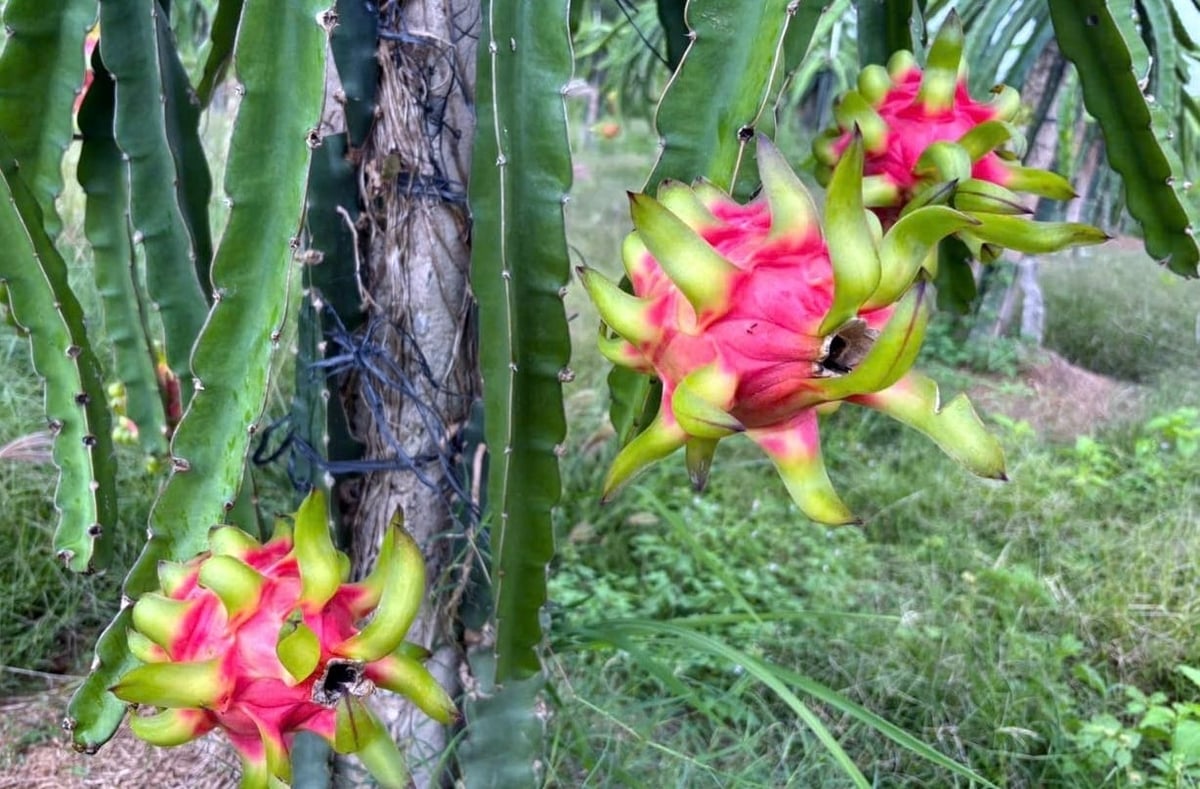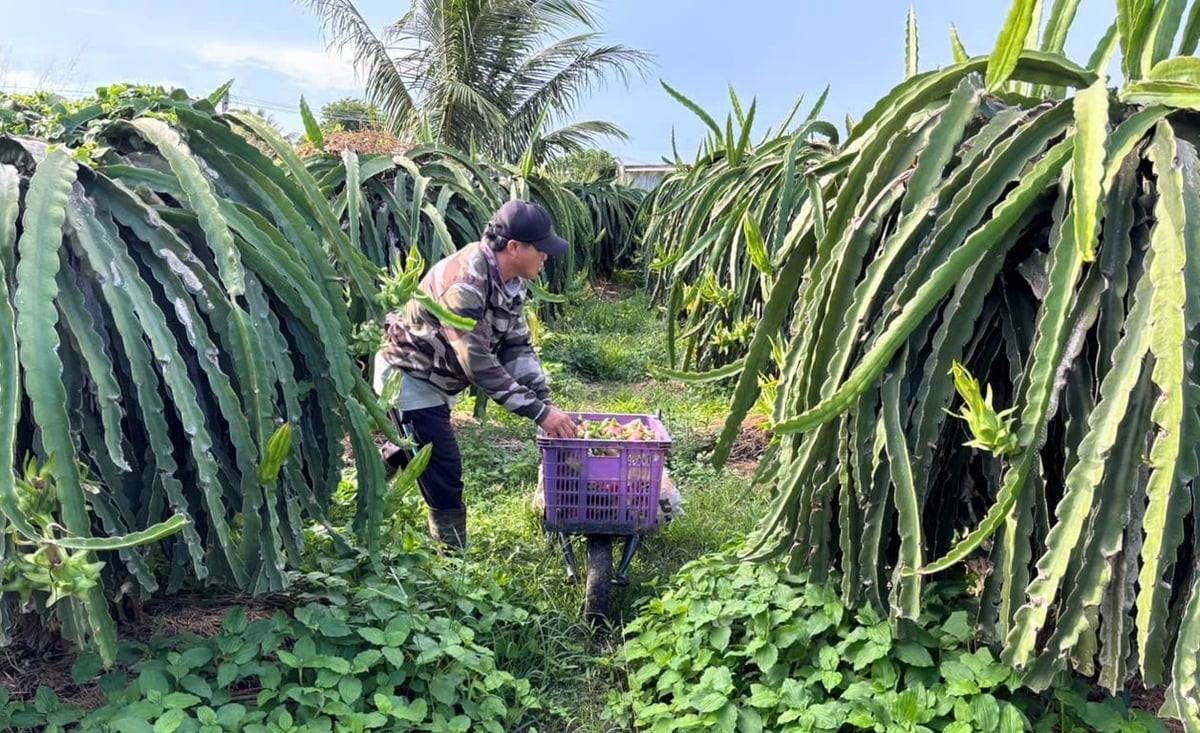November 28, 2025 | 18:12 GMT +7
November 28, 2025 | 18:12 GMT +7
Hotline: 0913.378.918
November 28, 2025 | 18:12 GMT +7
Hotline: 0913.378.918
In Ham Thuan Nam Commune, Lam Dong Province, Mr. Tran Quoc Thang, owner of a 46-ha dragon fruit farm producing under GlobalGAP standards, is facing potential losses of over VND 1 billion.

Mr. Thang's GlobalGAP-certified dragon fruit is being harvested in large volumes, but export companies are not buying for the European market. Photo: Kim So.
Mr. Thang shared that for many years, his farm has specialized in GlobalGAP-certified dragon fruit tailored to the European market, with stable prices of VND 18,000–20,000/kg for white-flesh and VND 28,000–30,000/kg for red-flesh varieties. Notably, fruit exported to Europe must meet strict size requirements (about 10 fruits per 3 kg), making it difficult to sell to other markets and even harder to distribute domestically.
Similarly, Son Tra dragon fruit farm—also located in Ham Thuan Nam Commune and spanning 20 ha under GlobalGAP standards—is facing the same dire situation.

In recent times, GlobalGAP-certified dragon fruit has enjoyed stable and high purchase prices. Photo: Kim So.
The farm owner shared that 30 tons of dragon fruit harvested since July 2 for export to Europe have yet to be shipped. Another 20 tons are expected to be harvested soon, but issues related to the export certification remain unresolved.
Mr. Huynh Canh, Chairman of the Binh Thuan Dragon Fruit Association, stated that the Binh Thuan region (Lam Dong Province) currently has over 26,000 hectares of dragon fruit cultivation, including more than 453 hectares under GlobalGAP certification.
According to Mr. Canh, the production value of GlobalGAP-certified dragon fruit is very high, currently around VND 28,000/kg for red-flesh varieties purchased directly at the farm. Previously, exporters only needed to ensure that shipments were free of pesticide residues to obtain phytosanitary certificates for exporting to the European market.

Farmers harvest ripe dragon fruit. Photo: Kim So.
However, since July 1, the European market has required that phytosanitary certificates must be issued by government authorities, rather than by exporters themselves or through third-party verifiers. This change has created a significant barrier.
“From July 1, 2025, until now, export companies targeting the European market have been unable to proceed with transactions due to the lack of a government-issued certificate as required. This has left hundreds of tons of dragon fruit from farmers and exporters stuck in storage, at risk of spoilage and total loss if certification is not issued in time,” Mr. Canh explained.
According to Mr. Canh, relevant authorities must act swiftly to identify the specific reasons behind the EU’s new requirement and develop urgent solutions to establish a government-led certification process. Resolving this bottleneck promptly would not only help rescue the stranded fruit but also restore farmer confidence and protect the reputation of Vietnamese dragon fruit in international markets.
Translated by Hoang Duy

(VAN) The signing of a protocol between Vietnam and China on the export of fresh jackfruit represents a significant milestone in agricultural trade cooperation between the two countries.

(VAN) On November 27, the Ninh Binh Department of Agriculture and Environment and the Institute for Green Growth Research organized a training course on greenhouse gas inventory for businesses.

(VAN) China’s cooking oil is suddenly flooding into India. It all comes down to a soybean surplus that Beijing doesn’t quite know what to do with.

(VAN) An Giang promotes supply-demand connections, standardizes quality and builds value chains, creating a foundation for sustainable bird’s nest development and aiming to expand exports.
/2025/11/24/5339-4-nongnghiep-075331.jpg)
(VAN) Recently, the conference on 'Sustainable Fisheries Linkage Chain - Tilapia for Export' took place in Tien Hai commune, Hung Yen province.
/2025/11/21/4309-2-153400_128.jpg)
(VAN) Green and low-emission rice is paving the way for Vietnamese rice to enter high-end markets, marking the beginning of a transformation journey toward greening and elevating the national rice brand.

(VAN) ‘Right to Win’ outlines a national action plan that shapes a new vision for Viet Nam’s agriculture in an era of renewal and global integration.